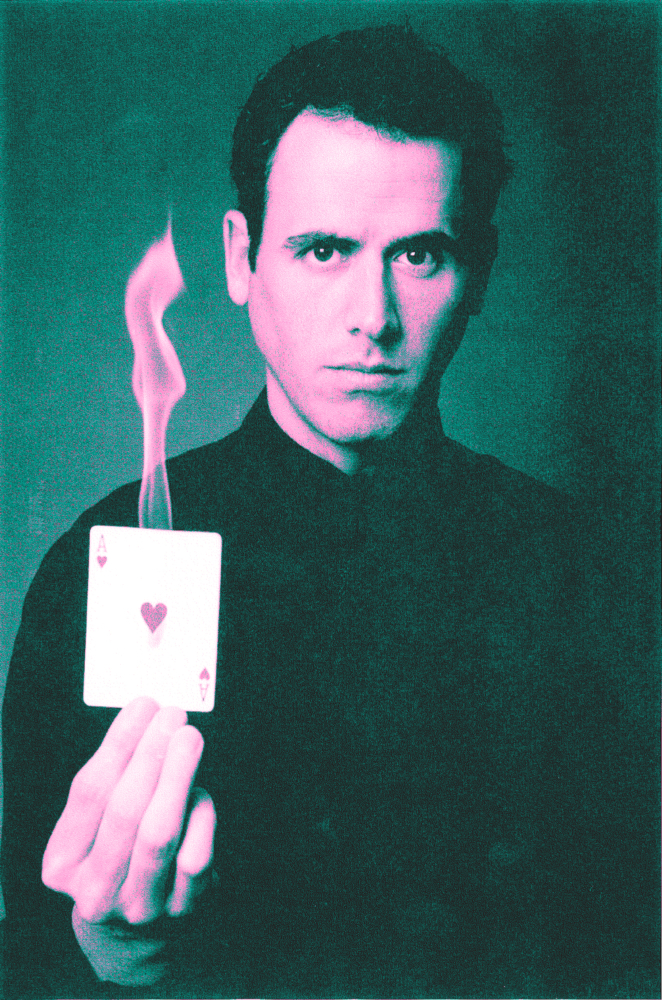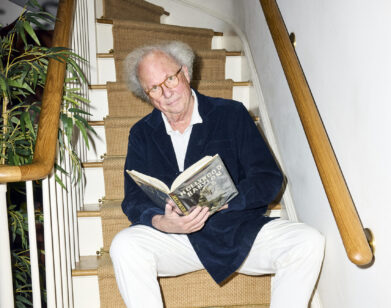Oz Pearlman Must Have A Pact With Satan

Oz Pearlman. Photo courtesy Anderson Group.
“He must have a pact with Satan.” That sentence isn’t often said in our office, but with the arrival of Oz Pearlman, the celebrity mentalist, America’s Got Talent finalist, and John Cena oracle, one of our editors is overcome with a feeling of disillusion. Pearlman has asked her to think of the name of someone whose birthday party she would be upset if she weren’t invited to, along with their birthday date, both of which he guesses accurately. (Caroline, May 3.) Maybe he Googled her daughter’s name, or maybe he’s just a freakish lip-reader, but when he lifts his wallet to pull a business card from its innermost zipper saying, “Wish Caroline a happy birthday for me,” it feels something like sorcery. “Get that guy out of here,” another slack-jawed editor says, before Pearlman pulls off yet another stunt: He asks two of our editors to shake hands, then freeze, then for one of them to close their eyes. He brushes Jack lightly across the hand and shoulder. He then brushes Chad lightly across the nose. When he asks him what he just did, Jack’s response is automatic: “You touched my nose.”
To be fair, Pearlman is far from a Satanic figure. Clean-shaven and rife with hand gestures, Pearlman, a New Yorker by way of northern Israel and Michigan, is the type of guy any Midtown suit would be comfortable grabbing a beer with, and that’s part of his shtick. “If I could read minds legitimately, everywhere, all the time, it would be super creepy,” he says. “I think literally nobody around you would want to be around you, because what if you knew everybody’s secrets?” Pearlman is the only mentalist who has appeared on both CNBC and the Today Show, and he attributes it to the fact that he used to work on Wall Street, while performing magic on the side. But whereas magic involves a quick hand and the right props, mentalism requires the fine-tuned ability to read people—their decisions, their doubts, their deceptions. “I have shows that I do for 10,000 people,” he says. “And I show up with a little case with a paper and pen, and that’s it. People are like, ‘What’s the show?’ I go, ‘I am the show.'”
Capping off a performance for “one of the largest banks in the world, if not the largest,” and ahead of performances for the National College Football Championships and America’s Got Talent: The Champions, Pearlman sat down with Interview, and leaves us with mouths agape and a cut-out of Lizzo now hanging on our wall. (Long story.)
———
SARAH NECHAMKIN: How did you get into this? Is it something you always knew you had a talent for?
OZ PEARLMAN: I actually worked a normal 9-to-5—well, more like 8-6. A Wall Street job. I did magic. That was my first passion when I was a teenager—sleight of hand, coin tricks and card tricks, things like that. From age 14 on, that’s how I paid for everything. I paid for college, my tuition, my books, my housing by doing this. Magic was my passion. When I quit my job, that’s when I started doing mentalism, which is very different. I have people that see me all time, and they go, “I hate magic, I hate magicians, but I love what you do.” It’s because it’s so different. I’m not knocking magic. I still love it to this day. But when you do a card trick, like, “Hey, you pick it, I put it back,” you know that somehow I did a move to make it happen. When you seemingly read someone’s mind or know how they’ll behave or decide things, it’s much more of an emotional connection because there’s no props.
NECHAMKIN: I’m so curious about how much you speak about your process and your practice, because there’s obviously a level to which you have to keep it very concealed for it to retain its wonder. Do people always ask you, “How do you do it? What’s your secret?”
PEARLMAN: All the time.
NECHAMKIN: How do you answer?
PEARLMAN: I had a show at one of the largest banks in the world, if not the largest, yesterday. These are very smart people. The CFO is there, the CEO is there. These are people that meet with global heads of state, and they’re just absolutely shell-shocked. It’s one of those things where one person said to me, “I could either try to figure this out or I could have fun.” I said, “It’s not mutually exclusive.” My goal is not to fool people. Fooling is a symptom or a side effect of a great show. Generally speaking, if people think they know how you did one or two things, it’s more memorable than if you fool somebody completely. If you think you know one, and then you don’t know the rest, you’re intrigued. On YouTube, for example, I have a few videos that have way more views than other ones. It’s ones where I messed up a little bit because people love that.
NECHAMKIN: Do you ever do that on purpose?
PEARLMAN: Yes and no, but people know what authenticity is. It’s like viral videos where people faked a thing. People can smell when something is off. Most of the time, if it’s a mess-up, it’s a real mess-up, but the best ones are when the mess-up goes full circle and it turns into something even more amazing.
NECHAMKIN: How would you describe your style?
PEARLMAN: My biggest success is in the corporate market, because I’ve got that look, the knowledge, the terminology. There’s no other mentalist that’s been on CNBC, Fox Business, all these different networks. I’ve been on almost every cable channel because I can customize my content. If I go on ESPN, everything is about sports. If I go on Rachel Ray, everything is related to cooking. If I go on CNBC, it’s all about stocks. My medium is mind-reading. Imagine you’ve woken up tomorrow and you could read people’s minds and influence their decisions. You could do that with any topic, right? Why would a superhero only have that one thing?
NECHAMKIN: When you do interviews, can you theoretically read someone’s mind?
PEARLMAN: If I’m in charge, yes. Or I can move in the direction that I want. I don’t go to the deli guy like, “You’re going to pick the pastrami for me today, and I don’t want the deli mustard, I want this.” It’s like a director who frames a shot. In this case, when I perform or in any interaction, I’m usually the person who is the director, or I position myself in that way.
NECHAMKIN: Interesting.
PEARLMAN: Think about interactions you have with people on a day-to-day basis. Think about how much framing matters. If somebody comes up to you and tries to sell you something, how instantly are you on the defensive? Your mind instantly goes to, “This person is trying to sell me something, they want my money.” What if that same dynamic flips, where it’s someone you weren’t expecting to sell you something? What if it’s someone who came in for an interview, and right now I start selling you something? You’re like, “What’s going on here?” The dynamic shifts. So much of what I do is about expectation, dynamics, the way people behave in different situations. If they’re one-on-one, if they’re in a group, and I know how your brain works in such a way that I can actually influence you before you do it. A lot of the time, the stuff you’ll think about, you will say to yourself, “There’s just no way you could have known that,” and I knew that before you even did it. Before anything you did, I’ve set everything up in a such a way that it will land at this point. People don’t believe that that’s possible. They think they’re very unpredictable, but people are predictable.
NECHAMKIN: Have you ever considered going into psychotherapy with such an intimate knowledge of the brain?
PEARLMAN: [Laughs] No. I like all happy thoughts. People are always like, “Do you enjoy your job?” How could I not enjoy my job? I’m not a funeral director. Everywhere I go, knock on wood, I bring joy. Every one in 1,000 of those people get so into it and so consumed that they go and start learning. That’s what happened to me.
NECHAMKIN: It’s a skill that you can pick up?
PEARLMAN: It’s 100 percent a skill you can pick up. I don’t claim to have psychic powers or supernatural abilities. I just think I have a very well-honed talent that I’ve worked at for over 20 years. It’s just like being a musician or a painter, anything like that. If you don’t have the initial talent, you’ll hit a certain ceiling. A comedian can’t tell jokes to the mirror and be like, “I think that’s funny.” You actually have to go out, do it, see what works, see what doesn’t, and iterate. The closest thing to me is a comedian, much more than a magician, because a magician can practice a trick over and over. They can videotape themselves doing it. With mentalism, it’s the flip. It’s 10% there, 90% audience. The reason there aren’t that many successful mentalists—and Google it, there’s not many—is because they got through the learning curve, and they were very thick-skinned because the first few years sucked.
NECHAMKIN: Do you practice on your family members?
PEARLMAN: No. I have a big, high-profile show this Saturday. I’m doing the National College Football Championships for the two teams, LSU and Clemson. I wanted to try something new. I ran it by my wife. She’s my toughest critic. She’s like, “That sounds boring.”
NECHAMKIN: I saw a show once by another mentalist, Scott Silven. His whole schtick is about the supernatural element to mentalism. He weaves in a narrative and leans into it, whereas you’re like, “I could be your coworker.”
PEARLMAN: In my show, I want everyone to come up, shake my hand, and ask to have a beer with me. If I could read minds legitimately, everywhere, all the time—and that’s what I want people to think I can do—it would be super creepy. Nobody would want to be around you, because what if you knew everybody’s secrets? When you perform a show where that’s pseudo-what you’re doing, you’ve got two channels. It’s either the creepy angle, where you’re not approachable, or, I am just like you, and how cool is this? Let’s experience it together.
NECHAMKIN: Do you find that these skills help you in life? I’m always thinking about speeches at award shows or reading the body language of politicians. Do you find that you have a strong intuition about how people are feeling in the public arena?
PEARLMAN: 100 percent. There are certain instances where it’s helpful. I was on a show called Million Dollar Listing New York on Bravo, and they brought me in for an open house, and it was just to read who’s going to be my buyer, how the negotiations played out. I think people do it, too. They just don’t trust their intuition. In a lot of instances when you think somebody is uncomfortable or lying or being deceptive, you probably know that, but you’re not sure of it. I’m more sure because, just based on the way my show works, I need to commit to things very quickly. I bet if you did it and we tried the same thing, you’d probably get 70 or 80 percent as many things right as me, but you would in that moment waver. You second guess yourself, and that’s where the problem lies. I don’t second guess.
NECHAMKIN: What has been your favorite performance?
PEARLMAN: America’s Got Talent, which I was on a few years ago. I got third. That was the biggest boost to my career. Some of those performances at Radio City Music Hall were incredible. I’ve been there for so many other things, and then you’re on stage performing there, to full house, and you know it’s on live TV. Fifteen million people were watching live; there’s nothing that compares. I’m going to be back on that show on Monday. It’s the one where they bring back fan favorites and winners called America’s Got Talent: The Champions.
NECHAMKIN: Is there anything you can share with me, crumbs of a secret?
PEARLMAN: I can share things with you, but it won’t be as applicable. So much of the things that you see on the frontend, I seem to read minds, but a lot of it is memory work. In some shows, I teach people in five minutes how to say the alphabet backwards, which is so absurd. What does that matter? It’s a different way to think of things. After five minutes, they can do it for the rest of their lives. I’m like, “Don’t do this to pass a sobriety test if you’re wasted.” You just learn how your memory can work, and how your brain can work, and see patterns. I’ll know 150 people’s names within a few minutes just walking around. It’s a muscle. It just needs to be exercised.






